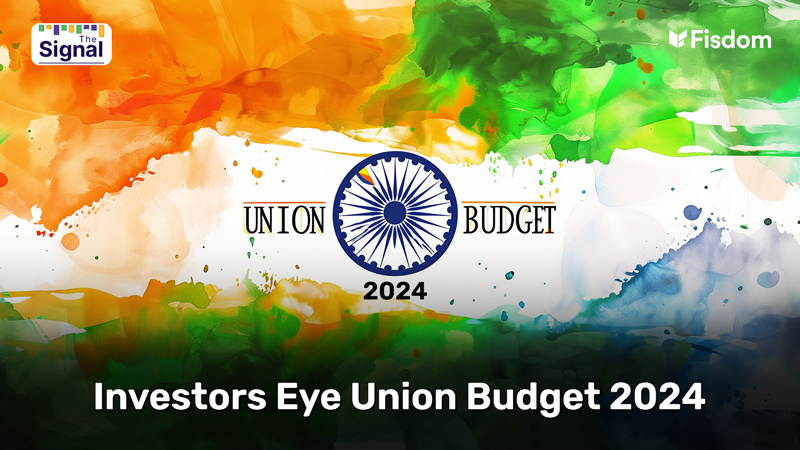
The Indian stock market has reached unprecedented heights in 2025, reflecting strong investor confidence in the country’s economic growth and corporate health. With Prime Minister Modi’s government entering its third term, the continuity of economic reforms—primarily in infrastructure development, boosting consumption, and enhancing rural incomes—seems to be a key factor that the market has factored in. Additionally, the Reserve Bank of India’s dividend to the government has alleviated some fiscal pressures, providing room for increased budgetary expenditure.
Expectations from Budget 2024
As we approach the announcement of the Union Budget 2024, the market is closely watching the new government’s economic policies and political strategies.
Key Anticipations
Revision of Income Tax Slabs: One of the primary demands from individual taxpayers is a revision of income-tax slab rates.
Section 80C Tax Deduction: There is a significant expectation for an increase in the Section 80C tax deduction limit, which currently stands at Rs 1.5 lakh. This deduction applies to various investments and specific expenditure categories, and an increase would be widely welcomed since the limit hasn’t been reviewed since 2014.
However, budget announcements often lead to market fluctuations driven by expectations. Given the BJP’s narrower victory margin, there may be a push for welfare measures to stimulate consumption, which has lagged since the Covid-19 pandemic. The government’s challenge will be to balance growth with fiscal prudence and inflation control.
Market Reactions Post-Budget
Neutral Reaction: Investors may remain neutral if the budget proposes a moderate 6-8% increase in capital expenditure and shows gradual fiscal improvement. Such measures would indicate fiscal prudence, and maintain market stability.
Positive Reaction: To boost retail consumption amid high interest rates, enhancing disposable income without overly populist measures will likely please investors. Expectations include significant relaxation in personal income taxes for individuals earning up to Rs 15 lakh annually, no increase in capital gains tax, and assurances against the reintroduction of wealth tax. A substantial rise in capital expenditure, particularly in infrastructure like roads and railways, along with initiatives to attract foreign direct investment, would be seen as highly favorable.
Boosting Key Sectors: The market would also react positively to incentives for manufacturing and job-creating sectors such as textiles, garments, leather, and handicrafts. Adjustments to the production-linked incentive scheme for sectors like electronics and electric vehicles, and support for tourism and travel, which indirectly benefits the services and logistics sectors, are expected. Measures in agriculture, fertilizers, and employment schemes aimed at the rural and urban poor will likely drive market optimism.
Education and Skill Development: A focus on education and skill development, including collaborations with foreign universities and research labs, would be crucial for long-term growth. Encouraging the corporatization of higher education and bridging the gap between education and job readiness through private sector involvement would be beneficial.
Startup Ecosystem: Abolishing the angel tax to support startups and ease funding for budding companies would position India favorably in the innovation landscape.
Potential Disappointments
Given the market’s record highs, any adverse announcements could lead to corrections. Increases in capital gains tax, measures that could deter participation in futures, options, or derivatives markets, and the introduction of wealth tax could disappoint investors. Austerity measures to control the fiscal deficit and inflation, along with poor optics for rural welfare, could also dampen market sentiment.
Ultimately, while initial reactions to the budget can be significant, investors typically take a week to fully digest the details and assess the budget’s impact on economic growth. The first budget of the Modi government’s third term will be scrutinized for its direction and inclusiveness, and any disappointments will be intensely debated.
In summary, the upcoming Union Budget 2024 holds the potential to significantly influence market sentiment, and investors are eagerly awaiting its announcements to gauge the future trajectory of India’s economic policies and growth.
Market this week
| 08th July 2024 (Open) | 12th July 2024 (Close) | %Change | |
| Nifty 50 | ₹ 24,329 | ₹ 24,502 | 0.7% |
| Sensex | ₹ 79,915 | ₹ 80,519 | 0.8% |
- The broader indices extended their record run but ended on a flat note, underperforming the main indices during the volatile week ending on July 12.
- Foreign Institutional Investors (FIIs) continued their buying spree, purchasing equities worth Rs 3,843.99 crore.
- Domestic Institutional Investors (DIIs) bought equities worth Rs 5,390.67 crore.
- On the sectoral front, the Nifty Information Technology and FMCG indices rose by 3.5% each, while the Nifty Oil & Gas index increased by 2.5%, and the Nifty Media index gained 1.3%. Conversely, the Nifty PSU Bank, Realty, and Metal indices each shed 2%, and the Nifty Auto index fell by 1%.
- The current phase of volatility is expected to persist as profit booking may continue ahead of the Budget, which is anticipated to provide more clarity on policy continuity.
Weekly Leaderboard
| NSE Top Gainers | NSE Top Losers | ||||
| Stock | Change (%) | Stock | Change (%) | ||
| ONGC | ▲ | 6.7 % | M&M | ▼ | (6.1) % |
| ITC | ▲ | 5.9 % | TATA Steel | ▼ | (3.5) % |
| Wipro | ▲ | 4.7 % | Adani Enterprises | ▼ | (2.6) % |
| HDFC Life Insurance | ▲ | 4.6 % | Shriram Finance | ▼ | (2.5) % |
| Britannia Ind | ▲ | 4.2 % | Bajaj Auto | ▼ | (2.1) % |
Stocks that made the news this week:
- Zee Entertainment shares surged by 7% in the afternoon session on July 12 following the firm’s announcement of plans to raise funds through the issuance of securities. In a filing with the exchanges, Zee Entertainment stated it would raise funds via the issuance of equity shares and/or other eligible securities through various methods, including private placement, Qualified Institutional Placement (QIP), preferential issue, or a combination of these approaches.
- Inox Wind surged over 10% on July 12, reaching an intraday high of Rs 175 on the National Stock Exchange (NSE). The stock gained attention as investors anticipate the upcoming Union Budget to continue focusing on renewable energy. Industry expectations for policy stability and investment in the sector, along with a recent order for 200 MW from a renewable C&I power producer for Inox Wind’s latest 3 MW Wind Turbine Generators (WTGs), have boosted the stock. The order includes end-to-end turnkey execution.
- Zomato shares rose nearly 3% to reach a new record high of Rs 223.25 on July 12 on the NSE, as investors anticipated the company’s Q1FY25 earnings. Recently turning profitable, analysts are closely monitoring Zomato’s performance in the quick commerce sector. Elara Capital projects that Zomato will report a revenue of Rs 39,600 crore in Q1FY25, a 63.9% year-on-year increase, driven by strong momentum in food delivery and quick commerce, and maintains Zomato as a top buy in the internet sector.














